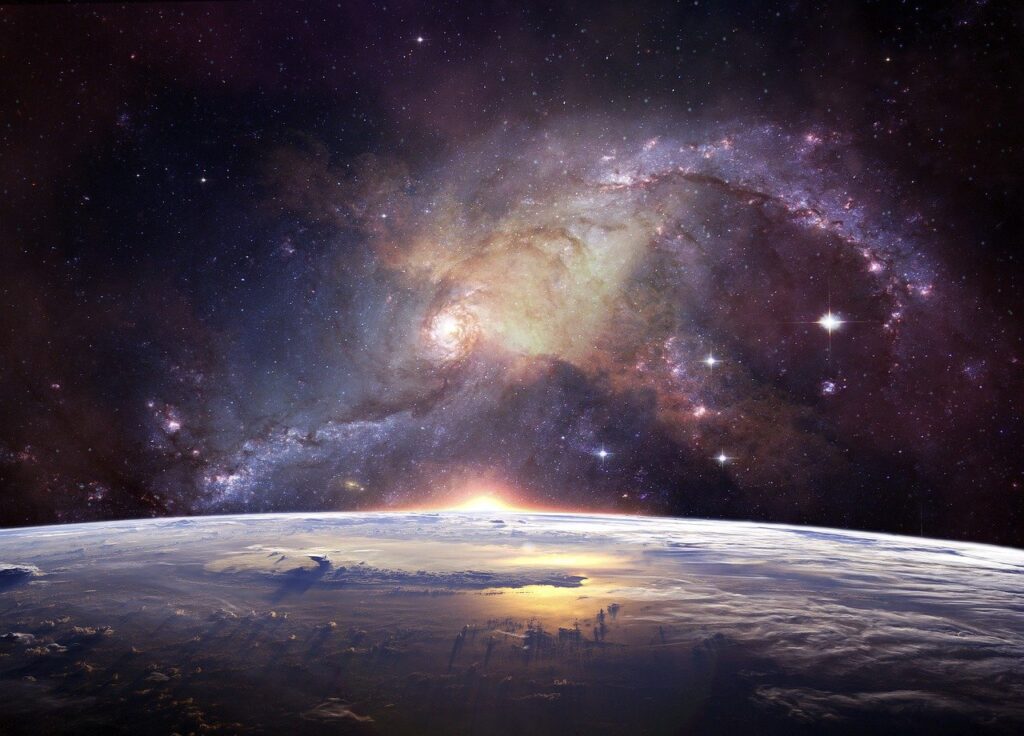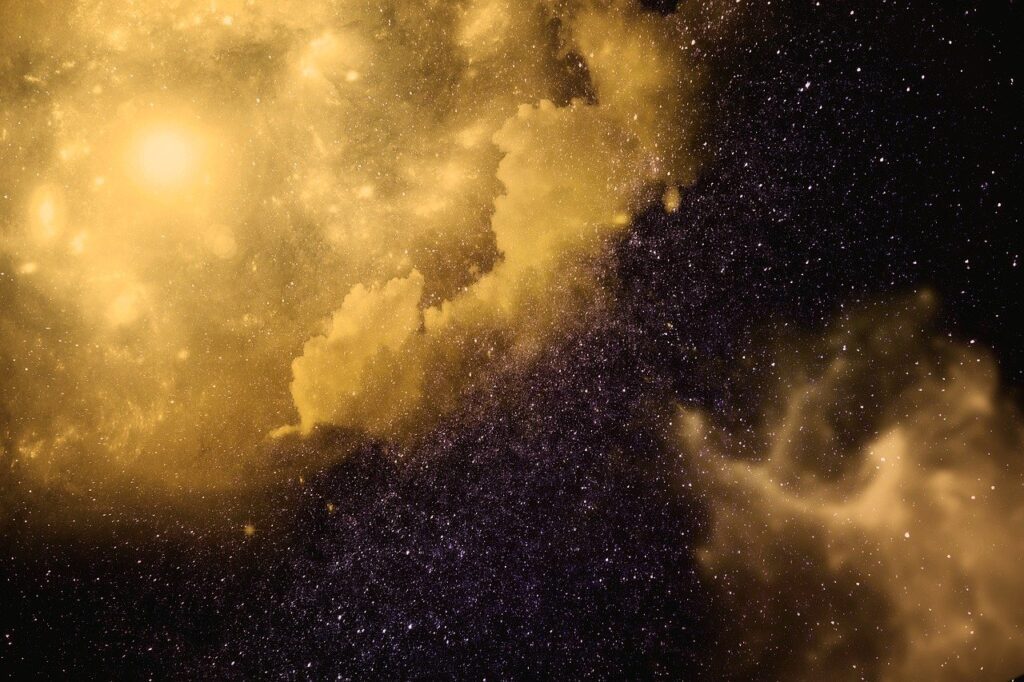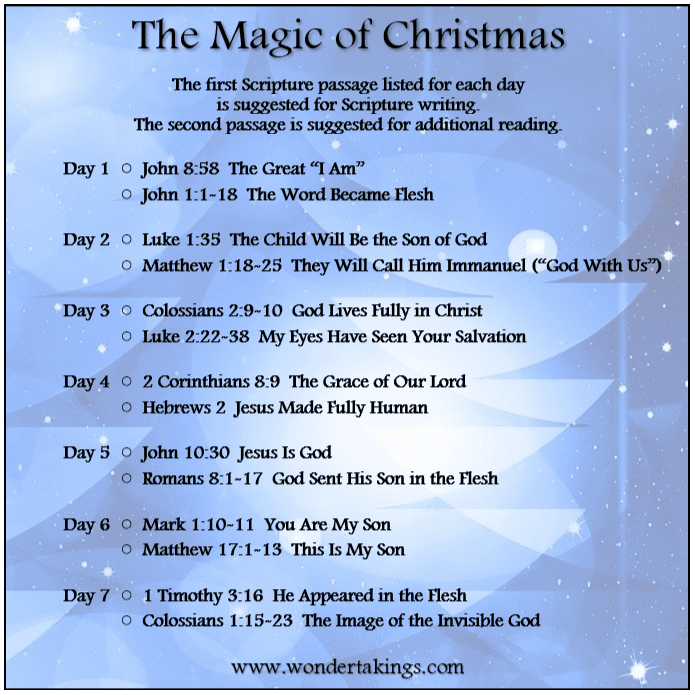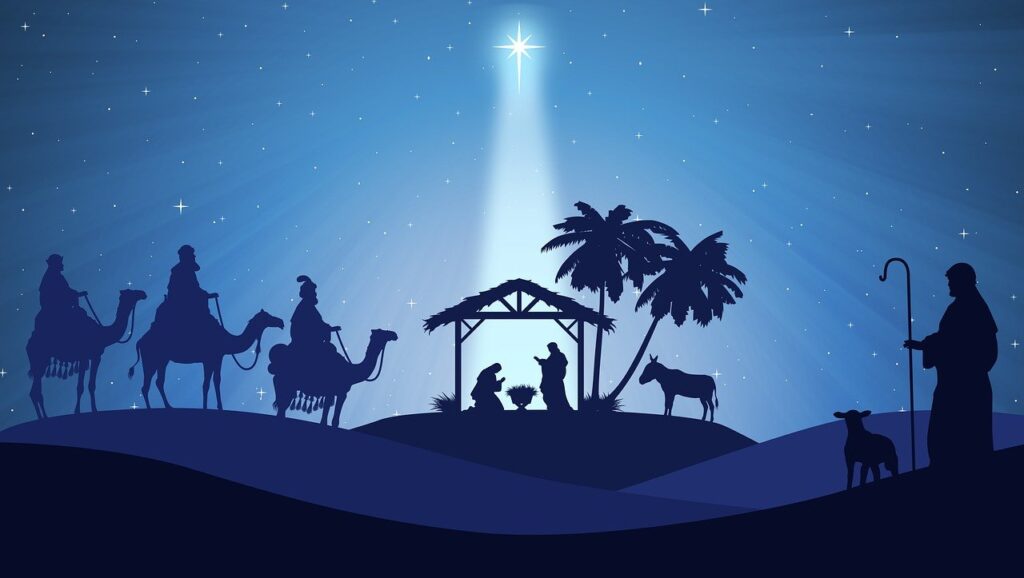The Magic of Christmas
“He is the image of the invisible God, the firstborn of all creation.”
Colossians 1:15 ESV

Why is Christmas such a magical time of year? Of all the holidays we celebrate, Christmas is probably the most planned-for, the most anticipated, and the most joyful. We decorate our houses, we light up trees, and we buy tons of presents. We watch Christmas movies, eat Christmas food, and sing Christmas songs. And amidst all of it is a sense of magic and wonder. But why now? Why not at Easter? After all, isn’t Easter the most “important” Christian holiday? Yes, but Christmas is when God’s plan of salvation was put in motion. It’s when He showed us that His love for us goes even deeper than we could have possibly imagined. It’s when the infinite, all-powerful God of the universe humbled Himself and became a tiny human, a baby born to die for us.
Anthony DeStefano discusses the miracle of the Incarnation in his book The Invisible World. He explains that God’s nature as pure Spirit means that He is invisible to us. When He created us to be physical beings, He created something different from Himself. He is something “totally other”. But God understands how hard it is for us to have faith in Him when we can’t see Him. So He designed an amazing solution:
“Somehow he has devised a way to be both seen and unseen at the same time. In fact, his solution was so original and surprising that only God himself could have come up with it. Two thousand years ago, God decided to become visible — every bit as visible as you and I and the grocer next door. But he did it in a way that would not allow us to ‘put him in a box,’ in a way that was not so overwhelming that we would be forced to bow down and worship at his feet, and in a way that still requires us to have faith in him. God’s solution to the great catch-22 of faith was Christmas. . . . The intangible God of Abraham and Moses finally became tangible. The eternal, infinite God, who fills every part of the universe, finally became a finite person.”
Anthony DeStefano, The Invisible World

“It all happened in a most remarkable moment . . . a moment like no other. . . . God became a man. Divinity arrived. Heaven opened herself and placed her most precious one in a human womb. The omnipotent, in one instant, became flesh and blood. The one who was larger than the universe became a microscopic embryo. And he who sustains the world with a word chose to be dependent upon the nourishment of a young girl. God had come near.”
Max Lucado, Grace for the Moment
God finally became visible to us. Even more than that, He became one of us. His Spirit inhabited a human body and showed us how to live. But that was just the beginning of His plan. By coming down He found a way to lift us up. By becoming the perfect sacrifice for our sins, He was the only One who could save us. From the moment of the first sin in the Garden of Eden, this was His plan. In His perfect time, in His perfect way, He came down to be our perfect Savior.
“The unseen Creator of the world at long last became visible to the world; with eyes and ears and a nose and a face. And it was the face of a little baby. The miracle of Christmas is that the child crying in the straw-filled manger is God. The little hand that reached up to his mother from the cradle is the very same hand that steers the stars and planets in their orbits. The eyes of the baby that dimly perceived the animals kneeling in the dark stable are the very same eyes that see all of history in one glance. It is because of the power of that child that you and I are able to take our next breath. What happened that first Christmas goes way beyond anything we can conceive of in our tiny intellects. God actually appeared at a specific time in human history, in a specific place, and with the cooperation of specific people. The great message of Christmas is that God himself has become specific.”
Anthony DeStefano, The Invisible World

“Who, being in very nature God,
Philippians 2:6-7 NIV
did not consider equality with God something to be used to his own advantage;
rather, he made himself nothing
by taking the very nature of a servant,
being made in human likeness.”
Christ came in love to save us and to show us how to live. In fact, if we could sum up the message God wanted to send us with just one word, it would be love. His love came down to us in the form of Jesus Christ. He taught us to serve others in love. And then He sacrificed Himself to save us because He loves us so much.
“Christmas is wondrous because it somehow captures the paradoxical nature of God. . . . God is a Being who is so far above us that he’s almost unfathomable and incomprehensible; yet he’s also someone we can relate to on the most intimate terms. . . . Christmas is really the focal point in time and space, because it represents the convergence of these paradoxes, the point at which the material and spiritual dimensions of the world meet. . . . Essentially, God came into our physical, material world because he knew how difficult it was for us to understand his own immaterial, spiritual world. He lowered himself to our level so that we could finally understand him on our terms. And even more important, he became a man so that he could raise us up above the world of matter and be caught up in the love of higher, invisible realities . . . .”
Anthony DeStefano, The Invisible World
That’s why Christmas is so special. That’s why it’s such a magical holiday. We’re celebrating the mystery of our infinite God coming to us in visible form to bring us the good news Himself: He has a plan to save us all so that we can live with Him forever in paradise. That’s worth celebrating!
“That’s why it’s so appropriate that the Christmas season is full of so many wonderful things — things that don’t even have to do with the practice of religion: all the hustling and bustling, all the twinkling lights, all the brightly colored bows, all those delicious Chrismas smells . . . the wonderfully gaudy, happy Christmas trees, the bright red poinsettias, the big green wreaths, the sparkling golden garland, the family gathering together, the excited children; and most of all, the feeling of anticipation — anticipation of presents, of people, of laughter. All of these things, together, create an atmosphere of magic; they convey the sensation that something different is going on here, something strange and wonderful, something totally other. And that’s the key.”
Anthony DeStefano, The Invisible World

“Today your Savior was born in the town of David.
Luke 2:11 NCV
He is Christ, the Lord.”
God broke into our ordinary world, and a regular night became remarkable. Angels appeared to ordinary shepherds to announce His arrival, and the holy sanctuary where they went to worship Christ was a simple stable. The details of His birth echo the fact that Christ is where the ordinary and the divine meet. To me, this is a beautiful object lesson that we don’t have to be “special” to have access to Christ. We can offer our simple, ordinary selves in worship of the divine Christ.
“An ordinary night with ordinary sheep and ordinary shepherds. And were it not for a God who loves to hook an ‘extra’ on the front of the ordinary, the night would have gone unnoticed. . . . But God dances amidst the common. And that night he did a waltz. The black sky exploded with brightness. Trees that had been shadows jumped into clarity. Sheep that had been silent became a chorus of curiosity. One minute the shepherd was dead asleep, the next he was rubbing his eyes and staring into the face of an alien. The night was ordinary no more. The angel came in the night because that is when lights are best seen and that is when they are most needed. God comes into the common for the same reason. His most powerful tools are the simplest.”
Max Lucado, Grace for the Moment

“Therefore the Lord himself will give you a sign.
Isaiah 7:14 ESV
Behold, the virgin shall conceive and bear a son,
and shall call his name Immanuel.”
Immanuel means “God with us.” We will never be able to fathom all that God is. We aren’t meant to. But He came to be with us so that we would understand what He wants us to know: that He loves us. We don’t fully grasp all the mysteries, but the message of Christmas is that we don’t have to go searching for God. He came to us. He came to bring us peace and hope. The following excerpt comes from a Christmas eve message I found in an old book of sermons:
“Christmas is the night of the simple and the profound. We come because we believe that in that midnight hour God was at work and because we might renew our wonder. We speculate about God but we cannot define him. We search for him with our instruments but we have not found him. We argue about him, but the end of the argument is no better than its beginning. But we believe that in the unfolding of this drama he has come to us. We have been grasped by these strange events and we cannot let them go. They belong to life itself. They express life’s mystery and they provide the hope of all life’s striving. We can neither discover God nor define him but we can learn of him. What do we learn of the God who comes at Christmas? We learn that God is here. We do not travel beyond the stars or engage in soaring wisdom or turn inward in ecstatic experience to meet God. . . . He is in public view in the history of man. He came into our time, into our existence, into the world of sense, of words, of witness, and of interpretation. He came as bone of our bone, flesh of our flesh. He came as our brother. . . . Life is greater than it sometimes seems and he reveals all of it to us. And so we worship this man Jesus and confess him Immanuel — God with us. Trust him. He comes to us with an open heart, giving himself, displaying himself, calling you to be what you were created to be, sons of God and men among men. He comes to you there where you are. He will break down the barriers, open the vistas, pull life together. He will show you the mountain tops, the green of the valleys, and grant you a vision. That is what life is for and this is what Christmas brings.”
“The God Who Comes at Christmas” by Kent S. Knutson
God comes to us where we are to show us what we can be. That’s the magic, and the miracle, of Christmas. This week’s Scripture passages focus on the wonder of God becoming human. There is a printer-friendly pdf version below the image. I have also posted a video of a beautiful hymn called “Love Came Down at Christmas.” It is based on a poem by Christina G. Rossetti, which I have included below. May this song remind us that our greatest response to God’s love for us should be to love Him and love others in return. Have a blessed, magical Christmas!

“Love Came Down at Christmas”
Love came down at Christmas,
Love all lovely, Love divine;
Love was born at Christmas,
Star and angels gave the sign.Worship we the Godhead,
Love incarnate, Love divine;
Worship we our Jesus:
But wherewith for sacred sign?Love shall be our token,
Christina G. Rossetti
Love be yours and love be mine,
Love to God and all men,
Love for plea and gift and sign.
“He became like us, so we could become like him.
Max Lucado, Grace for the Moment
Angels still sing and the star still beckons.
He loves each one of us like there was only one of us to love.”

References:
- DeStefano, Anthony. The Invisible World: Understanding Angels, Demons, and the Spiritual Realities That Surround Us. Kindle ed., Doubleday, 2011.
- Knutson, Kent S. “The God Who Comes at Christmas.” A Child Is Born: Messages for Advent, Christmas, Epiphany, edited by John McCollister, Augsburg Publishing House, 1972, pp. 43-47.
- “Love came down at Christmas (Eleanor Daley).” YouTube, uploaded by The Gesualdo Six, 17 December 2020, www.youtube.com/watch?v=GiEv-hQWZuo.
- Lucado, Max. Grace for the Moment: Inspirational Thoughts for Each Day of the Year. J. Countryman, 2000.
Images:
- Fir Trees featured image by Gerd Altmann from Pixabay
- Earth and Space image by Lumina Obscura from Pixabay
- DNA image by Gerd Altmann from Pixabay
- Christmas Ornament image by Jeff Jacobs from Pixabay
- Christmas Tree Stars image by Gerd Altmann from Pixabay
- Night Sky image by DarkmoonArt_de from Pixabay
- Nativity Scene image by Jeff Jacobs from Pixabay